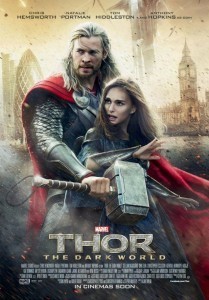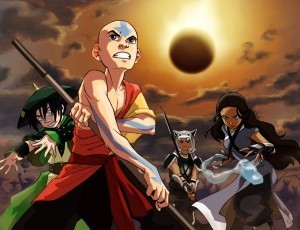Men Without Fear
I didn’t like Thor 2.
That took a lot of courage to say. Fandom is a strange thing and there are few fandoms stranger than Marvel. A slight against the Thor franchise is a slight against Chris Hemsworth, Tom Hiddleston, Idris Elba and (if you’re feeling saucy) Anthony Hopkins. When I first said I didn’t like this movie on twitter, I was lambasted. Peter V. Brett said my soul was dead (incidentally, he’s correct, but for different reasons).
But I still didn’t like Thor 2. I thought it was dumb. A lot of people who liked it seemed to agree with me on that, but went in, anyway.
And I was content to leave it that way until I was browsing Netflix while I was editing The City Stained Red one night, looking for something to play as background while I worked. I stumbled upon Hansel & Gretel: Witch Hunters, as it had been sitting in my recommended list like a ripe pimple waiting to be popped and figured “what the hell.”
I put it on.
And I didn’t get any editing.
Because I loved it.
And when you are a creative type (or maybe when you’re just me), loving something has dire implications. Because you can never just love something, you have to know why you loved it. You have to know what worked and what didn’t so you can steal what worked and reject what didn’t. You spend a lot of time dwelling on a movie that had a lengthy shot of a witch’s butt and sometimes, you ask yourself difficult questions.
Such as why I liked this unapologetically dumb movie and didn’t like an equally dumb movie that all my friends liked. People like Doug Walker have touched upon this subject before, but I had to suss it out for myself before I was ready to make this blog post. And I think I stumbled upon the answer just a few nights ago.
Hansel & Gretel: Witch Hunters does not take itself entirely seriously. Thor 2 does.
Now, I might just be speaking for myself here (since a lot of my friends clearly did not take Thor 2 seriously), but when a movie asks me to buy its premise, I’m in, and I read the tone of the movie from that premise.
The children from a cautionary tale about strangers survived and are fighting witches with a variety of awesome toys. The fact that they are telling me this basically means that we are in for something strange and humorous. To that end, all the silliness of the script is charming and the plot holes are excusable. Hansel has diabetes and keeps track of it with a clockwork syringe? Of course he does. Gretel fights witches in tight pants with a gatling crossbow? Naturally. Everyone in post-gunpowder Germany has American or British accents? Why not.
Because, at the end of the day, I’m watching a movie in which Gemma Arterton is shooting witches with a gatling crossbow while Jeremy Renner is suplexing witches into hay carts and it’s fun as shit.
Thor 2, though, asks me to buy into the premise that Asgardians have problems. Real, emotional problems of separation, abandonment, treachery. It’s set against a backdrop of action and adventure, but the premise is serious. Thor is having trouble, Loki is having trouble, Jane Foster is having trouble. This is a serious piece with some serious messages. And that means that the plot holes are harder to overlook, the inconsistencies are more difficult to swallow and the offensive pieces are a little more offensive.
I mean, I can’t be the only that noticed that Jane Foster was actually turned into a briefcase, right? Something more or less extraneous to the plot, but used to carry the thing that was important to the plot. I can’t be the only one that noticed the Asian character was written out of the movie in the first three minutes? I can’t be the only one that noticed Idris Elba stabbed a spaceship to death?
Were this a movie that took itself less seriously, these might not be so noticeable. That latter bit might actually be fun. But there was so little humor, so little joy, so much seriousness that these just took me right out. I did like Loki in the film (which seems not entirely groundbreaking), but I think only because his levity was such a reprieve from the choking overtones.
It might have escaped your notice that this crucial moral debate only came up while I was editing. Digesting stories of all kinds is crucial to a writer because it helps us understand our own stories better. And this was a debate I found that reflected pretty hotly on mine.
I don’t take my work or even my genre entirely seriously.
I mean, of course I don’t. I wrote a book in which a smelly, dirty woman killed a wizard with a jar of urine. I like doing that.
I like impractical clothing, I like silly banter, I like pee jokes, I like hare-brained schemes.
That caused me some concern.
We’ve discussed how not taking oneself too seriously can excuse certain problems. But does it preclude them? If Hansel & Gretel: Witch Hunters were to change gears and try to tell me something serious, would I listen? Can a story be light and dark in equal measure?
Can stupidity be an artistic choice and not just an excuse?
I’d like to hope so. Because I also wrote a book in which someone deals with a crippling despair that comes with saying goodbye to loved ones. All of the loved ones.
Given that this is an argument that revolves around examples in the media, it seemed befitting that I turn to more media to solve it. Or rather, it seemed befitting that, as I was talking to my friend Carl about this, he pointed out an example in the media where it worked perfectly. One of my favorite stories of all time, in fact.
Avatar: The Last Airbender.
I still, and probably forever will, hold this show up as one of the greatest shows of all time and one of the best stories ever told. It was epic, it was sprawling, it blew my mind.
And it was undeniably stupid at points.
There were pro-wrestlers who threw rocks at each other. There were greasy hicks in the middle of a swamp that made windboats out of magic. There were six-legged bison that flew through the sky and an army that was defeated by kids with hang-gliders and a gigantic, horrible drill so big as to be implausible, let alone impractical.
And yet, it was undeniably serious.
There were characters consumed with shame and self-doubt. There were budding romances that were the most important things in the world to these people. There was war, death, carnage. Every failure hurt and every betrayal stung. Sometimes, things looked so dark it was hard to believe that we’d ever get out of it, let alone believe that just last week we were in a cave that we could only find the way out of via the power of true love and magic badgers.
And I think that’s where Avatar’s strength lay.
And I think that’s what makes levity and even the occasional stupidity more valuable than any bleakness.
The two impact each other. A bit of comedy gives readers space to breathe and is almost welcome after they’ve been drowning in drama. Tragedy hits harder when the times have been good up until it strikes. The bleaker and darker things get, the more wild the triumph is. The live action movie of this was bad for so many reasons, but one of the big ones was that it forgot that this movie, at its heart, was energetic, wild and carefree enough to be stupid from time to time.
And speaking of movies I didn’t like, there was one aspect of Thor 2 I truly loved.
SPOILER ALERT.
When tragedy has been visited upon the Asgardians, a tragedy that strikes Loki more than anyone, Thor goes down to console him. Loki appears totally unfazed, smiling and laughing until Thor tells him to cut the crap. Loki cringes and his illusion falls away, revealing that, in his cell, he’s been an absolute wreck: taking out his anger on everything around him.
This, I think, only worked because Loki, up until this point, had seemed untouchable. And I think it only worked because he was finally forced to take things seriously. And I think it only worked with Loki because Thor, up until this point, had been taking everything seriously, so this didn’t seem to affect him as much.
I detest the word “balance” because it’s such a cop-out in conflict because obviously balance is ideal and extremes of anything are bad (hence why they’re called extremes). So maybe this blog post was more for my sake than for yours, giving me the opportunity to put this to words for me and working it out for myself. But if you managed to take anything from it, let it be that it doesn’t pay to take yourself too seriously.
Or let it be that Avatar: The Last Airbender is a fucking rad show and you should watch the hell out of it.
Whatever.
Sam Sykes's Blog
- Sam Sykes's profile
- 1214 followers






